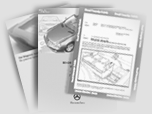 CAUTION! CAUTION!
Risk of Injury when performing Diagnostic Tests and repairs on components of the SRS system.
Store both airbags and side airbags with opening surface pointing upward.
Do not expose to temperatures above 100°C.
Interrupt any electrical current from reaching the airbag unit.
|
 CAUTION! CAUTION!
Risk of injury if airbag units and ETR units are ignited accidentally or if stored with the opening end facing downward which may cause the accidentally ignited components to fly about causing injury. Danger to persons also exists if the components are disposed of by cutting apart with cutting torches or other cutting/separation devices. Danger also exists if disposing the untriggered units via refuse collection or via smelting/carbonizing companies.
Protective measures/Supervision
- Place removed airbag unit with the opening side facing upward.
- Allow only properly trained dealer staff to supervise, purchase, transport, store, test/replace any of the SRS components.
- Install all airbag or ETR units once pulled from the parts department.
- Protect all airbag or ETR units from any sparks, open flame, or temperatures above 100°C.
- Do not transport airbag or ETR units in the passenger compartment, rather transport securely in their original packaging in the trunk.
- Do not allow oil, grease or cleaning agents come in contact with the airbag or ETR units
- Perform SRS tests only with approved test equipment (such as HHT), while installed in the vehicle without occupants.
- When reconnecting the vehicle battery or any outside electrical source, with the ignition turned ON, do not allow any occupants inside the vehicle.
- Airbag or ETR units which have been dropped from a height greater than 18 inches must be replaced.
- Prior to disposing the airbag or ETR units, the units must be made un-useable by discharging.
- In order to render the airbag and ETR unit un-useable, the specially made discharge harness must be used and at the same time maintain
a safe distance of at least 33 feet from the units being discharged.
Prior to undertaking any chassis/body repairs, installation/repair work on airbag and ETR units, or any components which come in contact with the airbag and ETR units, or are part of the electrical circuit of airbag and ETR units (such as installation of the steering wheel), the following conditions must be met:
- Remove ignition key.
- Disconnect any outside source of electrical circuit (i.e. battery charger).
- When performing interior repairs or welding operations, disconnect the connector from the SRS control module.
|
 CAUTION! CAUTION!
Risk of Injury when performing Diagnostic Tests and repairs on components of the SRS system.
Store both airbags and side airbags with opening surface pointing upward.
Do not expose to temperatures above 100°C.
Interrupt any electrical current from reaching the airbag unit.
Preparation for Test:
1. Review  11, 11,  12, 12,  13, 13,  20, 20,  21, 21,  22, 22,  23, 23,  31, 31,  32 32
2. Please see  11/3 for function of SRS MIL (A1e15). 11/3 for function of SRS MIL (A1e15).
|
| Test step/Test scope |
Test condition |
Nominal value |
Possible cause/Remedy 1) |
1.0 Supplemental Restraint System (SRS)
|
Ignition key in position "1". |
SRS MIL (A1e15) comes on and then extinguishes after approximately
4 - 20 seconds.
|
DTC Memory  12 12
|
2.0 Automatic Child Seat Recognition (ACSR)
|
Ignition key in position "1". |
Automatic child seat recognition warning lamp (N72e1) illuminates and then goes out after approx. 4 seconds.
(MB child seat model: "Babysafe" not installed).
|
Automatic child seat recognition warning lamp (N72e1) illuminates and does not go out:
 12 12
Automatic child seat recognition warning lamp (N72e1) does not illuminate:
 23 23  22.0, 22.0,
 23 23  20.0 20.0
|
1) Observe Preparation for Test, see  22. 22. |
Function of the SRS MIL (A1e15):
 SRS system is fully functional, if the SRS MIL goes out SRS system is fully functional, if the SRS MIL goes out
after 4 seconds.
 SRS MIL goes out after 2 minutes, system fault noted, SRS MIL goes out after 2 minutes, system fault noted,
occupant protection not affected.
Vehicle without side airbag:
- Low battery voltage
- SRS MIL
- Seat belt buckle latch 
Vehicle with side airbag:
SRS system is fully functional, if SRS MIL goes out after
approx. 4 - 20 seconds.
SRS MIL remains illuminated as long as the following faults are present:
- Low battery voltage
- SRS MIL
- Communication fault in the side bag sensors
- Seat belt buckle latch 
- Seat occupation recognition
 SRS MIL remains illuminated continuously, which may result in a non-deployment or a possible false airbag deployment. SRS MIL remains illuminated continuously, which may result in a non-deployment or a possible false airbag deployment.
 SRS MIL blinks after the replacement of the control module, the control module has not been programmed/parametered. SRS MIL blinks after the replacement of the control module, the control module has not been programmed/parametered.
Note: SRS MIL illumination can only be erased via the HHT, if no current DTC's are stored in memory.
The following applies to vehicles which have the Automatic Child Seat Recognition (ACSR) system installed.
 Function of automatic child seat recognition warning lamp (E13, N72e1) (AIRBAG OFF): Function of automatic child seat recognition warning lamp (E13, N72e1) (AIRBAG OFF):
If the "Babysafe" child seat is installed:
The automatic child seat recognition warning lamp (N72e1) (AIRBAG OFF) is illuminated and verifies the recognition of the "Babysafe" child seat.
The passenger-side airbag is turned off.
Side airbag and ETR remain in use.
 If the "Babysafe" child seat is NOT installed: If the "Babysafe" child seat is NOT installed:
Automatic child seat recognition warning lamp (N72e1) (AIRBAG OFF) goes out after approx. 4 seconds.
If the automatic child seat recognition warning lamp (N72e1) (AIRBAG OFF) does not go out after approx. 4 seconds, this indicates a fault in the ACSR system.
When turning on the vehicle illumination, the automatic child seat recognition warning lamp (N72e1) is dimmed as well. |
|


 Printable version
Printable version


 CAUTION!
CAUTION!  11,
11, 22.0
22.0 SRS system is fully functional, if the SRS MIL goes out
SRS system is fully functional, if the SRS MIL goes out 